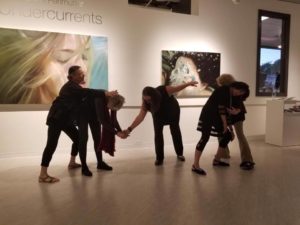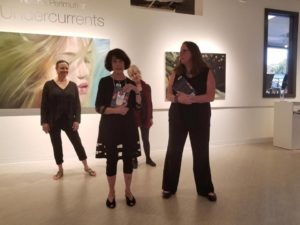
Using InterPlay performance forms to Dance on Behalf of Caregivers.
“It’s gonna get way worse,” the doctor told the patient and his caregiver wife a year into their journey with Alzheimer’s.
“Not sure what to do with that downer statement,” the wife told me as we talked about strategies for the caregiver’s self-care in this situation of the longest of goodbyes.
[bctt tweet=”It’s true deterioration is a given, not only in degenerative diseases, but in life itself. Trees shed their leaves, flowers, animals, and all living things, including people, age and die–sometimes swiftly, sometimes in a slow dissolve.” username=”@sheilakcollins”]
Most people past a certain age remember at least one phone call, or written test result, or matter-of-fact tone of gloom in a health care provider’s voice as he gave the illness the name of a life-threatening disease. If symptoms and the search for what’s wrong have been long, even not-good news can seem a relief.
I remember a phone call I received from my then 86 year-old father who had not been feeling well of late. In a matter of fact, almost casual tone of voice he made the statement he would repeat four more time, once to each of my siblings. “I need to tell you I’ve been diagnosed with lung cancer. Guess all that smoking I did years ago finally caught up with me.” And so begins a death-defying journey.
When the usual treatment for breast cancer didn’t work for my 40 year-old daughter, we began a search for something that would. There were on- line searches for traditional and non-traditional approaches to healing, increased prayers and well wishes from friends, family members, and the people we turned to for support. There were second and third medical opinions, and eventually medical trails of treatments that had showed promise in working for some people. Everyone involved was clear that things could get way worse, but we held on to the hope that things could get way better as well. Doctors sometimes said they didn’t want to offer “false hope,” but my daughter didn’t believe there was such a thing. “Hope is hope,” she said, “you either have it and keep it with you or you don’t.
My sister has had what she calls, “memory problems” for over 10 years, and things have gotten worse. She currently lives in an assisted living facility near her son and grandchildren far away from the rest of the family. But during the years doctors have searched for, and disagreed upon, the name of her disease. A center in Ann Arbor kept testing and ruling out Alzheimer’s. Finally one researcher admitted that it could be Alzheimer’s, “but, if it is, it’s the slowest Alzheimer’s I’ve ever seen,” he concluded.
When she moved to Boston the experts there decided that she did have Alzheimer’s, but the good news was, that qualified her to participate in a new research trial. They needed one more scan for the baseline, and then, after looking at those results they determined she did not have Alzheimer’s. This meant she didn’t qualify for the trial.
[bctt tweet=”So named or unnamed, our conditions deteriorate, then improve, then deteriorate again. What our family has come up with to survive and thrive this roller coaster as caregivers and patients, friends and supporters, ” username=”@sheilakcollins”]
[bctt tweet=”“Stay in the eternal NOW. It’s all we ever have, and it never serves us well to get too far ahead into the “wherefores,” what ifs’ and “whens.” ” username=””]

Introducing StillPoint at Fort Works Art Gallery to the backdrop of the beautiful exhibit by Reisha Perlmutter: undercurrents.
I’m just back from the 1st Texas book tour, where co-author, Christine Gautreaux and I performed the second edition of our recently released book, “Stillpoint: A Self-Care Playbook for Caregivers to Find Ease, and Time to Breathe, and Reclaim Joy- www.stillpointselfcareplaybook.com
-Sheila

